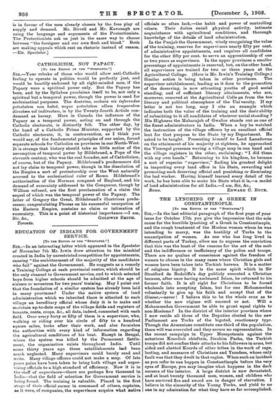EDUCATION OF INDIANS FOR GOVERNMENT SERVICE.
[To Titil EDITOR OF THE "SPECTATOR."] Sin,—In an interesting letter which appeared in the Spectator of November 7th Mr. Irwin drew attention to the mischief created in India by unrestricted competition for appointments, causing "the embitterment of the majority of the candidates who fail" against the Government. He suggests as a remedy a Training College at each provincial centre, which should be the only channel to Government service, and to which selected boys from higher schools should be admitted at the age of sixteen or seventeen for two years' training. May I point out that the foundation of a similar system has already been laid in many provinces ? Under the native system of land administration which we inherited there is attached to each village an hereditary official whose duty it is to make and maintain up-to-date maps of the village fields and registers of tenants, rents, crops, &c., all data, indeed, connected with each field. Over every forty or fifty of them is a supervisor, who, walking or riding over his circle of fifty to a hundred square miles, looks after their work, and also furnishes the authorities with every kind of information regarding the agricultural conditions of his beat. Except in Bengal, where the system was killed by the Permanent Settle- ment, the organisation exists throughout India. Until some thirty years ago these establishments had been much neglected. Many supervisors could barely read and write. Many village officers could not make a map. Of late years pains have been taken to bring both village and super- vising officials to a high standard of efficiency. Now it is in the staff of supervisors—there are perhaps five thousand in India—that the field of selection for Government service is being found. The training is valuable. Placed in the first stage of their official career in command of others, captains, as it were, of companies, the supervisors acquire what native
officials so often lack,--,the habit and power of controlling others. Their duties entail physical activity, intimate acquaintance with agricultural conditions, and thorough knowledge of the details of land administration.
In the Punjab the Government, wisely recognising the value of the training, reserves for supervi sors nearly fifty per cent. of administrative appointments, and requires all candidates for the other fifty per cent. to serve an apprenticeship of one or two years as supervisors. In the upper provinces a smaller percentage of appointments is reserved, but, on the other hand, all supervisors are trained for two or three years at the Agricultural College. (Here is Mr. Irwin's Training College.) Similar action is being taken in other provinces. The supervisor establishment, leading as it does to the promotion of the deserving, is now attracting youths of good social standing, and of sufficient literary attainments, who are, moreover, removed at the Agricultural Colle ge from the too literary and political atmosphere of the University. If my letter is not too long, may I cite an example which indicates both the value of the training and the desirability of submitting to it all candidates of whatever social standing ? His Highness the Maharajah of Gwalior stands out as one of the finest administrators in India. When a boy he watched the instruction of the village officers by an excellent official lent for that purpose to the State by my Department. He asked to be taught. Presenting himself to Lord Lansdowne on the attainment of his majority at eighteen, he approached the Viceregal presence waving a village map in one hand and the village registers in the other, exclaiming: "I did these with my own hands." Returning to his kingdom, lie became a sort of superior "supervisor," finding his greatest delight in inspecting every land office in his State, rewarding and promoting each deserving official and punishing or dismissing the bad worker. Having himself learned every detail of the work, he has been able to make his State what it is,-.-a model of land administration for all India.—I am, Sir, &c.,






































































 Previous page
Previous page